Complete Solutions to Conceptual MCQs Single Option Correct of chapter KINEMATICS of Class 11 book with complete answers and questions
| Class 11 | PHYSICS |
| Chapter | KINEMATICS |
| PHYSICS GALAXY | Conceptual MCQs Single Option Correct |
| Number Of Questions | 35 |
| Academic Year | 2023-24 |
For a particle moving along a straight line, the displacement x depends on time `t` as `x=At^(3)+Bt^(2)+Ct+D`. The ratio of its initial velocity to its initial acceleration depends on:
View SolutionFor the displacement time graph shown in figure -1.100, the ratio of the speeds during the first two seconds and the next four second is :
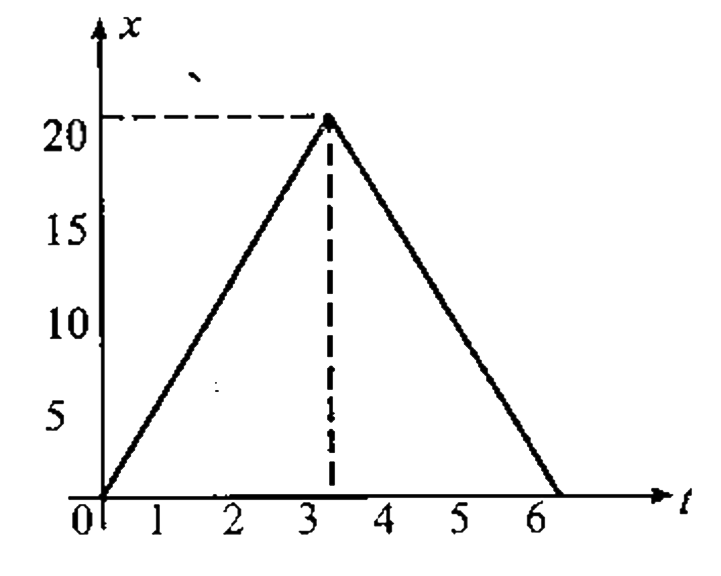
View SolutionFrom the top of a tower, a stone A is thrown upwards and a stone B is thrown downwards with the same speed. The velocity of stone A, on colliding with the ground is :
View SolutionTwo cars `C_(1)` and `C_(2)` are moving on parallel roads in the same direction with velocity v. The relative of `C_(1)` w.r.t. `C_(2)` is :
View SolutionA ball dropped from a height reaches the same height after elastic impact with a glass floor. If the event is continued, the velocity-time graph is shown by the adjoining figure :
View SolutionThe distance-time curve of a moving motor-car is according to the following figure-1.101. The portion OA of the curve shows:
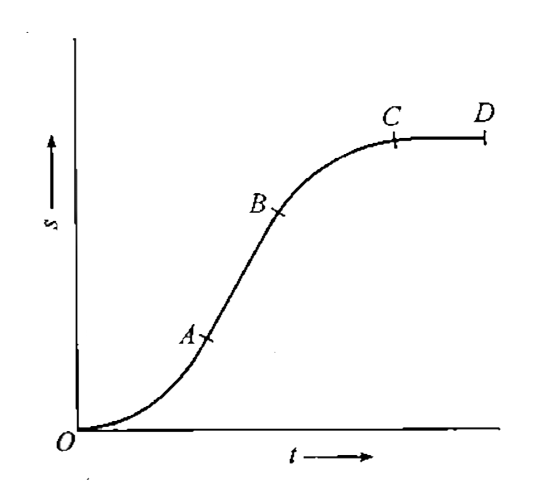
View SolutionIn the above figure, the portion AB of the curve shows:
View SolutionIn the above figure, the portion BC of the curve shows:
View SolutionTwo particles start from rest simultaneously and are equally accelerated throughout the motion, the relative velocity ofone with respect to other is :
View SolutionThe following graph shows the speed ofabody which is :
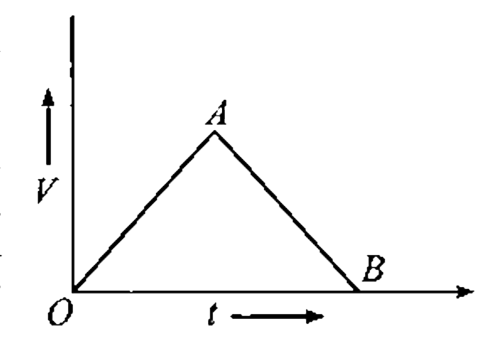
View SolutionThe following figures show some velocity versus time curves. But only some of these can be realised in practice. These are:
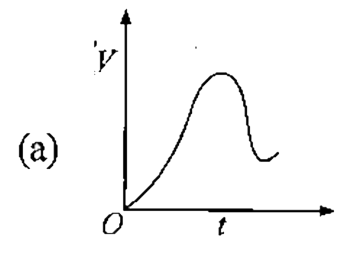 ,
, 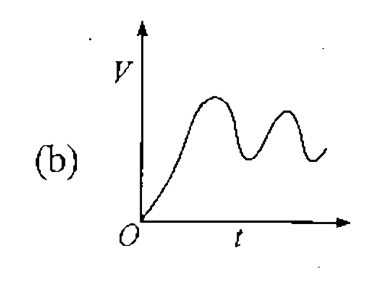 ,
, 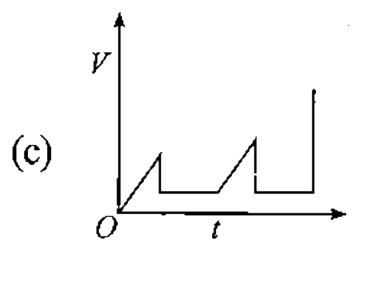 ,
, 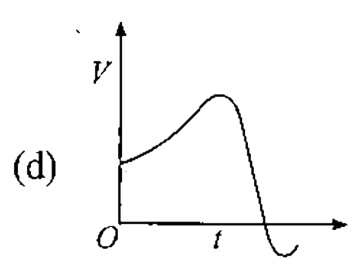
View SolutionThe distance travelled by the moving body is :
View SolutionThe diagram shows the velocity-time graph for a particle moving in a straight line. The sum of the two shaded areas represents :
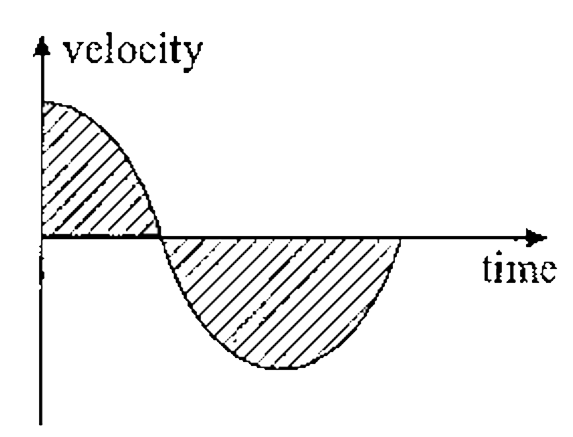
View SolutionForces proportional to AB, BC & 2 CA act along the sides of triangle ABC in order, their resultant represented in magnitude and direction as:
View SolutionA particle moves as shown in the following figure 1.104:
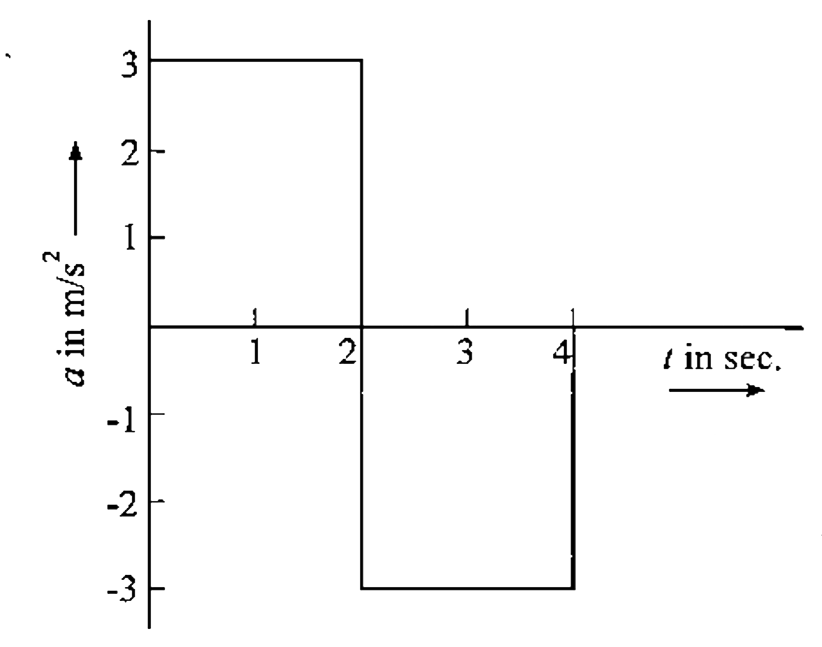
From the above curve the correct velocity-time graph for the interval of 4 seconds will be :
View SolutionThe following figure-1.105 shows the velocity-time graph ofa body. According to this, at the point B:
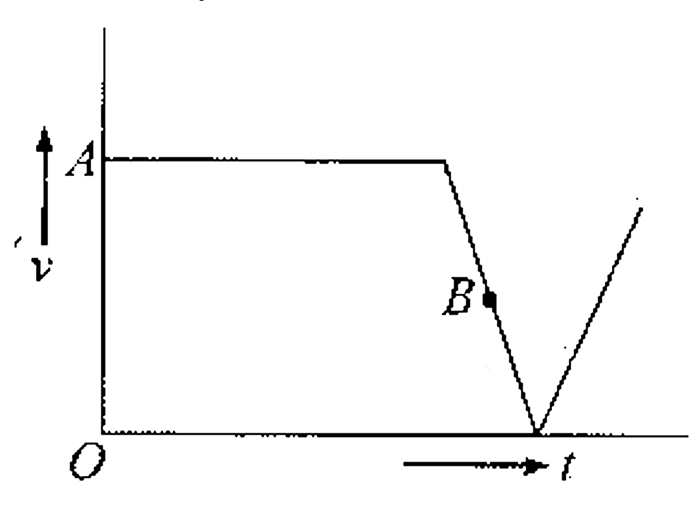
View SolutionA bullet is fired in a horizontal direction from a tower while a stone is simultaneously dropped from the same point then :
View SolutionWhich graph in the following figure best represents the variation of velocity with time of a ball which bounces vertically on a hard surface, from the moment when it rebounds from the surface ?
View SolutionThe variation in the speed of a car during its two hour journey is shown in the graph of the figure-1.106. The magnitude of the maximum acceleration of the car occupies an interval of:
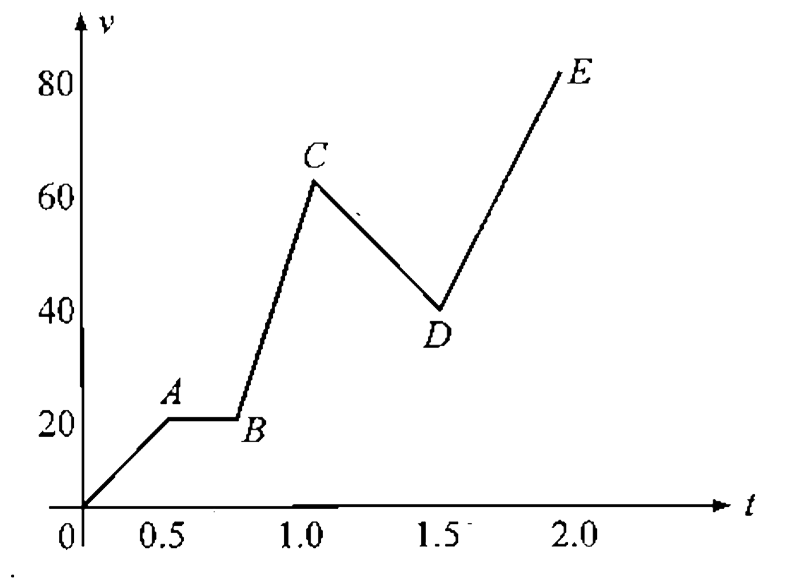
View SolutionA car which has front and rear glass screens almost vertical is moving on a road when rain drops' are falling vertically downward. The rain will strike:
View SolutionA river is flowing from north to south at a speed of 0.3 kph. A man on the west bank of the river, capable of swimming 1 kph in still water, wants to swim across the river in the shortest time. He should in a direction:
View SolutionA time-velocity graph of two vehicles A and B starting from rest at the same time is given in the figure-1.107. The statement that can be deduced correctly from the graph is :
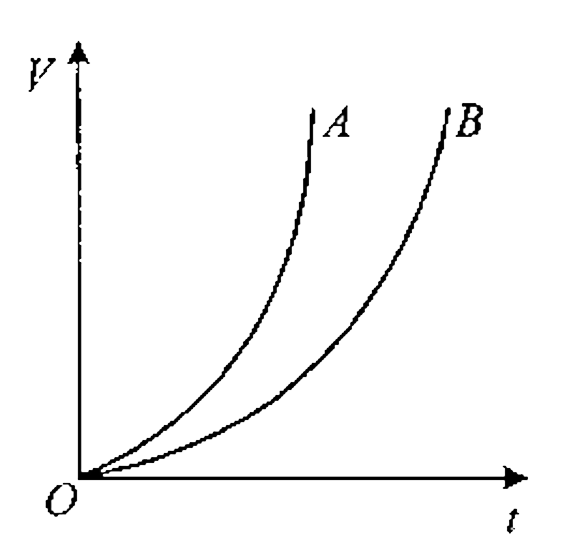
View SolutionMark the correct statements :
View SolutionThe force acting on a particle moving along a straight line varies with time as shown in diagram.
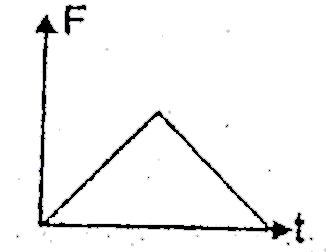
Which of the following graphs is best representative of its speed and time graphs. Initial velocity the particle is zero.
View SolutionAn object is dropped from rest. Its velocity versus displacement graph is:
View SolutionA stone is dropped from a balloon rising with acceleration a. The acceleration of the stone relative to the balloon is :
View SolutionThe Figure-1.109 shows the displacement-time graph ofa body subject only to the force of gravity. This graph indicates that:
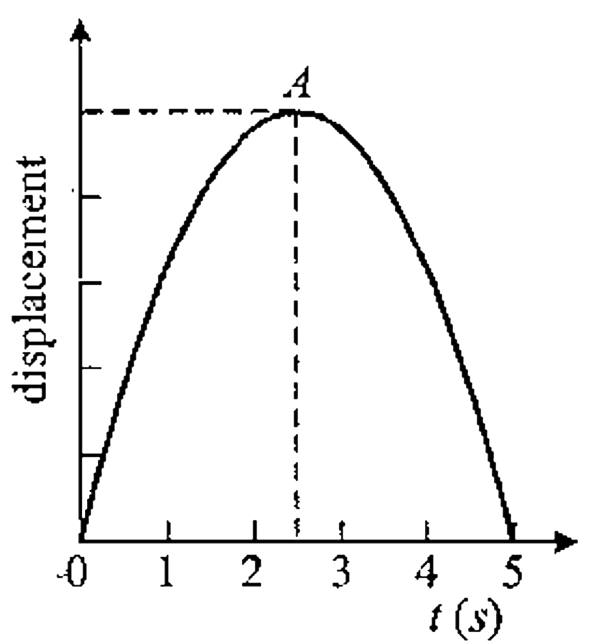
View SolutionTwo particles are projected simultaneously in the same vertical plane from the same point, with different speeds `u_(1)` and `u_(2)`, making angles `theta_(1)` and `theta_(2)` respectively with the horizontal, such that `u_(1) cos theta_(1) = u_(2) cos theta_(2)`. The path followed by one, as seen by the other (as long as both are in flight), is
View SolutionA ball is projected vertically up with an initial velocity. Which of the following graphs represents the KE of the ball?
View SolutionThe velocity of a particle moving in straight line is given by the graph shown here. Then its acceleration is best represented by :
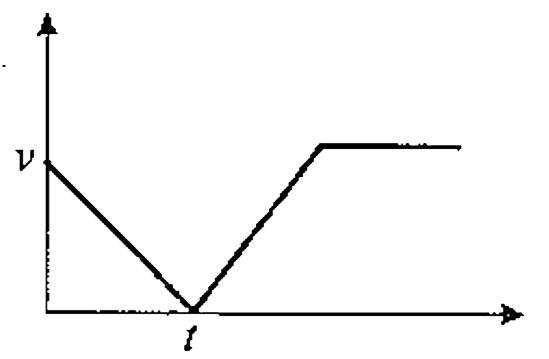
View SolutionA ball is thrown up with a certain velocity at angle `theta` to the horizontal. The kinetic energy varies with height h of the particle as:
View SolutionA small object is dropped from the top of a building and- falls to the ground. As it falls, accelerating due to gravity, it passes window. It has speed `v_(1)` at the top of the window and speed `v_(2)` at the bottom of the window, at what point does it have speed `(v_(1)+v_(2))/2` ? Neglect the air resistance.
View SolutionAcceleration vs time graph is shown in the figure for a particle moving along a straight line. The particle is initially at rest. Find the time instant(s) when the particle comes to rest?
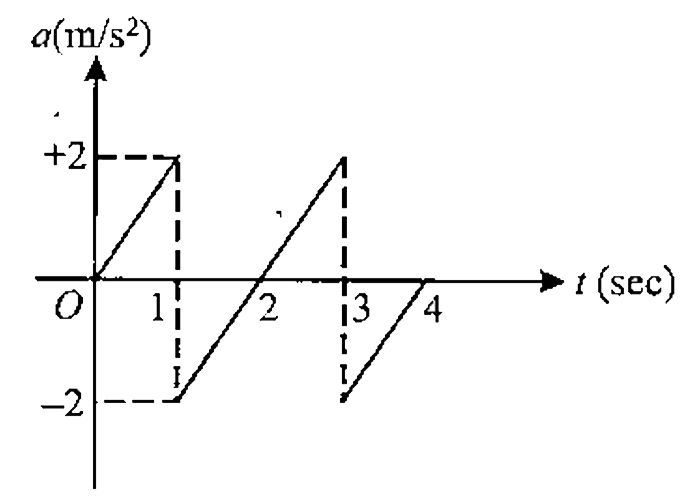
View SolutionA toy car is moving on a closed track whose curved portions are semicircules of radius 1 m. The adjacent graph describes the variation of speed of the car with distance moved by it (starting from point P). The time `t` required for the car to complete one lap is equal to 6K second. Find K. (take `piln 2~~2`)
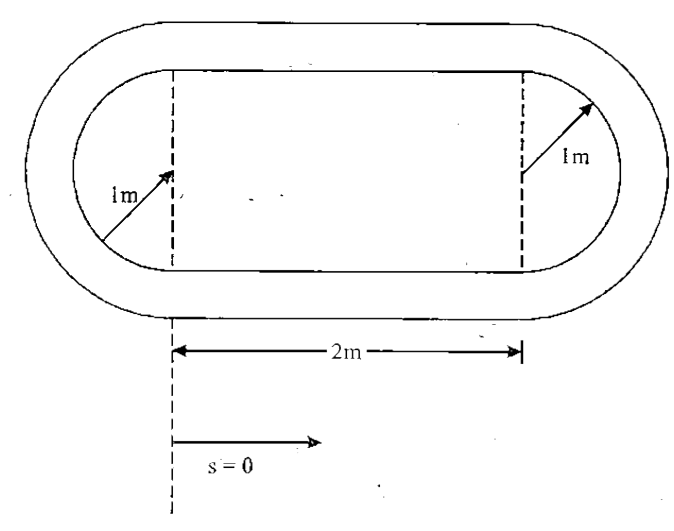
View SolutionWhich of the following sets of displacements might be capable of returning a car to its starting point?
View Solution
Conceptual MCQs Single Option Correct questions and complete solutions for chapter KINEMATICS of GK PUBLICATIONS PHYSICS (HINGLISH) of Class 11